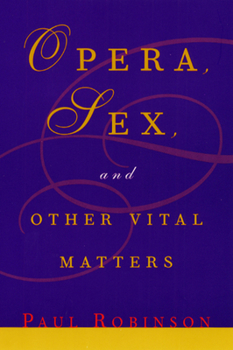Opera, Sex, and Other Vital Matters
Select Format
Select Condition 
Book Overview
Opera, Sex and Other Vital Matters gathers both classic and never-before-published essays from one of the leading stylists in contemporary American letters, and one of our more revered public intellectuals, Paul Robinson. Diverse and elegant, the essays in this collection showcase the sly wit and lightly worn erudition of their author. Each celebrates art and the flesh, directing us to the twin ecstasies of music and eros.
Format:Paperback
Language:English
ISBN:0226721833
ISBN13:9780226721835
Release Date:June 2002
Publisher:University of Chicago Press
Length:332 Pages
Weight:1.06 lbs.
Dimensions:0.8" x 6.0" x 9.0"
Customer Reviews
1 rating
Intellectual history for music lovers
Published by Thriftbooks.com User , 20 years ago
This is a brave book, in a way that reflects how any intellectual might be considered brave for basing his work on his passions, writing about the things he enjoys thinking about, and trying to combine bits and pieces of a lifetime in intellectual history in something that might still seem to be just small doses. My main interest was in topics that get hardly more than a page, like furtive mentions of Luce Irigaray in his consideration of Freud's position in the landscape of feminism. The deeper into this I look, the more I am likely to find the kind of thing that Paul Robinson would say: "I won't pretend to understand Lacan's reasoning here, or to explain how Freud's essentially preverbal infant can be reconciled with Lacan's linguistic fabrication, but one needs to recognize that within the world of Lacanian psychoanalysis the self is a symbolic creation, and the privileged symbol or `signifier' (to use his own terminology) is the phallus. So selfhood, language, and phallic consciousness all belong to the same order of things, to the same intellectual register." (p. 269). I was going to say that this book shows its bravery by starting with "A Symposium on OPERA AND IDEAS with Bernard Williams and Peter Kivy" (pp. 3-29) in which the philosophers who read one of Paul Robinson's six major books had the opportunity to go first in stating their observations about what is most debatable in his work. Peter Kivy is onto the serious Enlightenment message in Mozart's THE MARRIAGE OF FIGARO, in contrast to the mocking treatment of Reason and Humanity in Rossini's THE BARBER OF SEVILLE on page 5, but later questions the essence of this argument with: `It is one thing for music to be shallow, another for it to "express" shallowness or anything else by being shallow. And, in my view, the reason why THE MARRIAGE OF FIGARO is moving and THE BARBER OF SEVILLE is not is solely because Mozart's music is what it is, deep and unutterably beautiful, while Rossini's is what it is, wonderfully pleasing, titillating, and shallow. It has nothing to do with "content." ' (p. 7). The humor of this book is in replies like Paul Robinson's: `I am prepared to accept this criticism--and to accept Professor Kivy's distinction between expression and representation--but, perhaps because I am not a philosopher (to put it mildly), I don't feel the weight of the distinction quite so strongly as he does.' (p. 22). With 8 selections about opera, including the intellectual judgment "Strictly as a thinker Wagner was a hopeless third-rater" (p. 136), 5 selections in a section on Sex, two appreciations of historian H. Stuart Hughes first published in 1987 and after his death in 1999, thoughts about writing published in the `New Republic' in 1979 and 1980, and the kind of essay that "elicited a torrent of angry letters from cat-lovers" (p. 308), this book dances around the themes that make music as meaningful as life in the minds of people who prefer one as much as the other.





